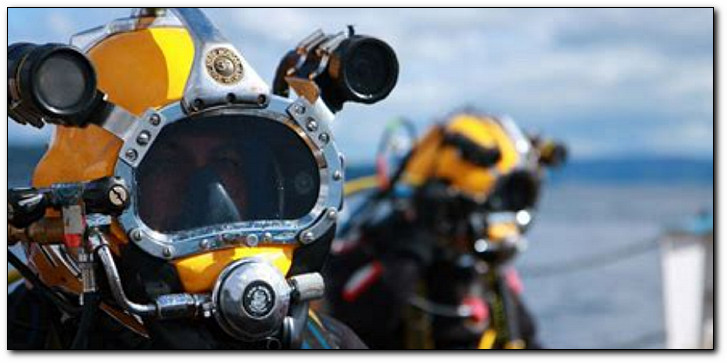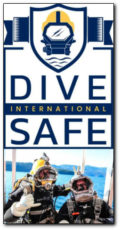The Value of Competency Based Certification
By CADC Admin ~ November 25th, 2024. Filed under: CADC MAG, Latest Diving News.
(Pre Print – Winter 24-25 CADC Mag)
 In November 2001, it was announced at a CSA meeting in Toronto that the Canadian Association of Diving Contractors (CADC) under the leadership of their Executive Director Jim Wilson, was going to lead the development of a federally regulated not-for-profit organization to certify the competence of divers across Canada. The goal was to replace the system that the National Energy Board (NEB) had put in place in the late 1980’s, a system that the NEB had declared was no longer part of their purview.
In November 2001, it was announced at a CSA meeting in Toronto that the Canadian Association of Diving Contractors (CADC) under the leadership of their Executive Director Jim Wilson, was going to lead the development of a federally regulated not-for-profit organization to certify the competence of divers across Canada. The goal was to replace the system that the National Energy Board (NEB) had put in place in the late 1980’s, a system that the NEB had declared was no longer part of their purview.
Everyone wanted them to succeed, and with good reason. The value of competency-based certification by an independent, nationally recognized organization was apparent to all present.
Divers saw the value in replacing a plethora of certificates with one nationally recognized certificate showing their principal diving qualification on the front, and various endorsements on the back. A certificate issued by the Diver Certification Board of Canada (DCBC) accomplished this mostly because it was designed by divers for divers. While the CEO was an expert in terms of competency and certification, he was not a diver.
Supervisors were supportive because they also wanted a single certificate which showed all of their qualifications. They also wanted to be sure that the divers they worked with were as qualified as they said they were. Having a certificate issued by a national independent body gave them confidence in their divers. Contractors were similarly pleased to have a reliable source from which to obtain verification of competence and experience.
Over time, regulatory bodies came to appreciate the competency certification provided by DCBC. Regulators no longer had to go through the lengthy process of certifying divers. They had only to write in their regulations that divers had to be proven competent as described in the CSA Competency Standard Z275.4 and then look for a DCBC certificate. CSA Z275.4 applies to occupational diving, hyperbaric facility, and remotely operated vehicle (ROV) operations conducted in connection with all types of work and employment and describes the requirements for minimum competency levels for all personnel directly associated with the identified techniques of diving or ROV operations. Canadian safety and health legislation requires that all workers be competent to perform the work assigned to them. It requires competency in both the theory and use of the type of diving apparatus or ROV employed. This Standard had been established to provide diver and ROV training facilities, and the diving and ROV industry, with a uniform minimum level of competency necessary for the various levels of diver and ROV techniques. Currently the DCBC is the only Canadian national organization that certifies diving and ROV personnel as meeting the CSA Standard.
As mentioned, commercial diver certification in Canada was first put in place by the National Energy Board (NEB) in the mid to late 1980’s in support of the development of the oil and gas fields off the coasts of Newfoundland and Nova Scotia. Canadian divers who held NEB certificates had international recognition, particularly from those nations working in the North Sea. Those divers wanted to retain their international recognition therefore DCBC’s CEO was dispatched to the UK to discuss the issue with officers of their Health and Safety Executive (HSE), and of the International Marine Contractors Association (IMCA). Discussions with the HSE led to an agreement that national diver certifying bodies had to have national government oversight and be totally independent of the commercial diving industry in each country. Thus began the total separation of the CADC and DCBC.
The result was an independent certification system (DCBC) which retained for Canadian offshore divers the international recognition they had grown to enjoy under NEB. The meetings with HSE, followed soon after by meetings with Paul Butler of the Australian Diver Accreditation Scheme (ADAS), led in short order to the creation of the International Diving Regulators Forum, later to become the International Diving Regulators and Certifiers Forum (IDRCF) involving Australia, Canada, France, Norway, South Africa and the United Kingdom. The IDRCF guaranteed Canadian unrestricted surface supplied divers world-wide recognition, all based on competency-based certification. In the following years the IDRCF was expanded to include IMCA and ADCI of the United States.
Clients looking to hire competent contractors to guarantee themselves a successful outcome, also wanted to protect themselves from liability issues by doing due diligence. More and more operators (clients) have begun to hire Inshore Diving Safety Specialists (IDSS), certified by DCBC as having at least eight years experience in at least seven areas of diving expertise. Any diving supervisor with eight years of experience would appear to be competent in most aspects of diving however while experience and competence complement each other, they are different; competence can be measured whereas experience cannot.
That is perhaps why IMCA has put into place a Continued Professional Development program. In order to retain good standing in IMCA, supervisors have to study experiential safety reports and complete regular, quarterly assessment exams in order to demonstrate continued proficiency, or competence. Once again, competence can be measured whereas experience cannot.
The DCBC certification is based on the CSA Competency Standard, CSA Z275.4. This Standard goes far beyond simply requiring a certain number of hours of training; it includes specific competency elements involving diving theory, tools, burning, welding and various underwater activities at specified depths. For example, to be considered competent each diver must complete a diver rescue at 165 fsw, in addition to the plethora of other underwater skill described in the standard.
DCBC has put in place a program that allows any diver or diving supervisor to demonstrate the competencies required of the standard, whether their initial training was in Canada or overseas. The Prior Learning Assessment & Recognition (PLAR), is a process that allows divers to apply their previous diving and training experience towards a DCBC certificate. If the assessment review shows a diver is lacking in any specific competency, they can attend an accredited training establishment and demonstrate those competencies. The system is designed to include every competent person, not to exclude them.
The bottom line is that competency-based certification demonstrates to the world that you are competent to carry out the duties that are required of a person in your position. It is the strongest performance indicator to any potential employer, no matter at what level you are employed.
Author: DCBC Nov 2024






